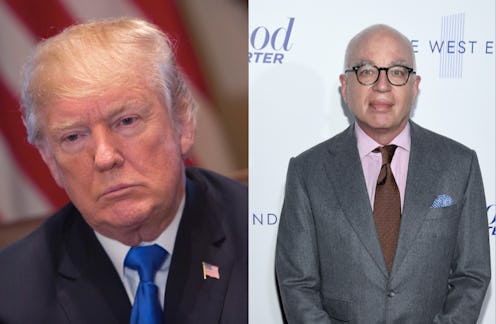News
The Author Of The Scandalous Book About Trump Has A Controversial Reputation, Too

A forthcoming book about the inner workings of the Trump administration during the president's first year in office is causing an uproar in the White House. Fire and Fury: Inside the Trump White House comes out on Tuesday, but various released excerpts have already provoked the president's ire: They include explosive claims about his behavior and disparaging quotes from people close to him. So who is Michael Wolff, the author of Fire and Fury?
Wolff is a 64-year-old journalist who's written for Vanity Fair, New York Magazine, and The Hollywood Reporter, among other publications. Prior to Fire and Fury, he was probably best known for his unflattering book about media mogul Rupert Murdoch and his other writing about the media; The New Republic once called him "the It Boy of New York media."
TNR's profile of Wolff, written after he won the National Magazine Award in 2004, describes his skill at writing about people and gossip, especially related to elites and the media.
Wolff is the quintessential New York creation, fixated on culture, style, buzz, and money, money, money.
However, it does also note that Wolff is less good at covering politics.
Indeed, much of what enabled him to pull back the curtain on the Manhattan media scene — his New York-centrism, his obsession with (and proximity to) the city's power players — is precisely what makes him poorly qualified to comment on much else.
He seems well-positioned, then, to have written Fire and Fury, which does not attempt to delve into the political dimensions of Trump's first year — instead, it depicts the drama and conflicts that took place in the president's inner circle.
Wolff spent 18 months speaking with the people around Trump and reportedly conducted over 200 interviews in that time; these form the basis of Fire and Fury. Some of the most bombshell aspects of the book quote Steve Bannon, a former advisor to the president who was fired in August. Wolff writes that Bannon called Donald Trump Jr.'s meeting with a group of Russians during the presidential campaign "unpatriotic" and even "treasonous."
Trump released a statement condemning Bannon on Wednesday. "Steve Bannon has nothing to do with me or my Presidency," he wrote. "When he was fired, he not only lost his job, he lost his mind."
Trump's lawyers released a cease and desist order to Wolff and his publisher on Thursday demanding that they halt publication of Fire and Fury and of any new excerpts. The letter charges that Wolff's book includes false information that could be libelous.
Some claims in Wolff's book are already being called into question. For instance, an excerpt released in New York alleges that former Fox News CEO Roger Ailes suggested that Trump appoint John Boehner, former Speaker of the House, as his chief of staff, to which Trump replied, "Who's that?" But The Washington Post reports that Trump did, in fact, know Boehner — He has golfed with Boehner and tweeted about him.
Wolff himself is no stranger to controversy. In 1998, for example, some of the information in his dot-com boom memoir Burn Rate was disputed. The magazine Brill's Content wrote that one of his characters was "actually a composite of three people" and that 13 people featured in the book claimed that Wolff "invented or changed quotes." Wolff responded to the piece with one of his own, explaining that Burn Rate was "both true and satirical."
His defense of Fire and Fury takes a similar tone. He claims that the book is sometimes literally factual and at others times more figuratively true, in that it includes claims from sources that could be false but more or less accurately illustrate the world of the White House.
Wolff writes in his introduction to the book:
Many of the accounts of what has happened in the Trump White House are in conflict with one another; many, in Trumpian fashion, are baldly untrue. Those conflicts, and that looseness with the truth, if not with reality itself, are an elemental thread of the book. Sometimes I have let the players offer their versions, in turn allowing the reader to judge them. In other instances I have, through a consistency in accounts and through sources I have come to trust, settled on a version of events I believe to be true.
Wolff says that he broached the idea of writing a book about the goings-on in the White House to Trump after the election. The president didn't explicitly say yes, but his "non-disapproval became a kind of passport for me to hang around," Wolff explained in a Hollywood Reporter article. He says that he then occupied "something like a semi-permanent seat on a couch in the West Wing."
Fire and Fury doesn't come out until Tuesday, but it's already topping the bestsellers list on Amazon.